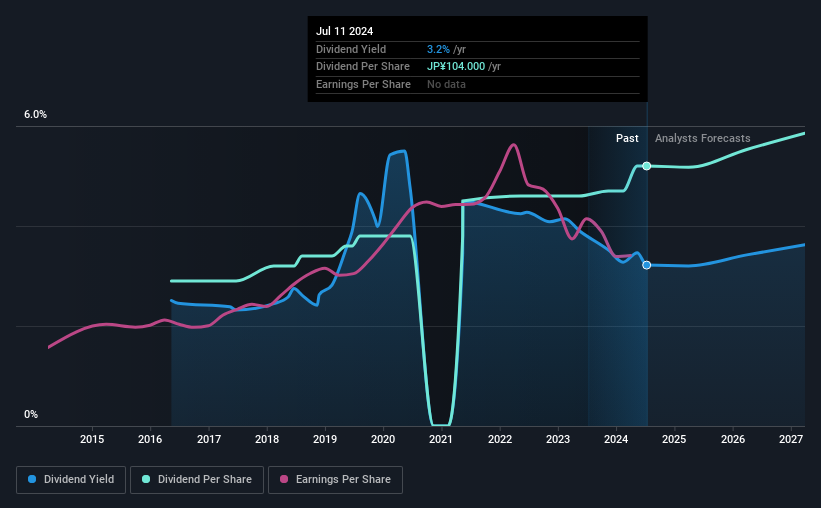Japan Post Insurance (TSE:7181) Will Pay A Larger Dividend Than Last Year At ¥52.00

The board of Japan Post Insurance Co., Ltd. (TSE:7181) has announced that it will be paying its dividend of ¥52.00 on the 5th of December, an increased payment from last year's comparable dividend. This takes the annual payment to 3.2% of the current stock price, which is about average for the industry.
See our latest analysis for Japan Post Insurance
Japan Post Insurance's Payment Has Solid Earnings Coverage
We aren't too impressed by dividend yields unless they can be sustained over time. Based on the last payment, Japan Post Insurance's earnings were much higher than the dividend, but it wasn't converting those earnings into cash flow. Since a dividend means the company is paying out cash to investors, this could prove to be a problem in the future.
Looking forward, earnings per share is forecast to rise by 2.3% over the next year. Assuming the dividend continues along recent trends, we think the payout ratio could be 47% by next year, which is in a pretty sustainable range.

Japan Post Insurance's Dividend Has Lacked Consistency
It's comforting to see that Japan Post Insurance has been paying a dividend for a number of years now, however it has been cut at least once in that time. This suggests that the dividend might not be the most reliable. The dividend has gone from an annual total of ¥58.00 in 2016 to the most recent total annual payment of ¥104.00. This works out to be a compound annual growth rate (CAGR) of approximately 7.6% a year over that time. It's good to see the dividend growing at a decent rate, but the dividend has been cut at least once in the past. Japan Post Insurance might have put its house in order since then, but we remain cautious.
Dividend Growth May Be Hard To Achieve
Given that the dividend has been cut in the past, we need to check if earnings are growing and if that might lead to stronger dividends in the future. Earnings per share has been crawling upwards at 2.5% per year. Japan Post Insurance is struggling to find viable investments, so it is returning more to shareholders. This isn't bad in itself, but unless earnings growth pick up we wouldn't expect dividends to grow either.
In Summary
Overall, this is probably not a great income stock, even though the dividend is being raised at the moment. While the low payout ratio is a redeeming feature, this is offset by the minimal cash to cover the payments. We would be a touch cautious of relying on this stock primarily for the dividend income.
It's important to note that companies having a consistent dividend policy will generate greater investor confidence than those having an erratic one. Still, investors need to consider a host of other factors, apart from dividend payments, when analysing a company. Case in point: We've spotted 3 warning signs for Japan Post Insurance (of which 2 are significant!) you should know about. Looking for more high-yielding dividend ideas? Try our collection of strong dividend payers.
New: Manage All Your Stock Portfolios in One Place
We've created the ultimate portfolio companion for stock investors, and it's free.
• Connect an unlimited number of Portfolios and see your total in one currency
• Be alerted to new Warning Signs or Risks via email or mobile
• Track the Fair Value of your stocks
Have feedback on this article? Concerned about the content? Get in touch with us directly. Alternatively, email editorial-team (at) simplywallst.com.
This article by Simply Wall St is general in nature. We provide commentary based on historical data and analyst forecasts only using an unbiased methodology and our articles are not intended to be financial advice. It does not constitute a recommendation to buy or sell any stock, and does not take account of your objectives, or your financial situation. We aim to bring you long-term focused analysis driven by fundamental data. Note that our analysis may not factor in the latest price-sensitive company announcements or qualitative material. Simply Wall St has no position in any stocks mentioned.
Have feedback on this article? Concerned about the content? Get in touch with us directly. Alternatively, email editorial-team@simplywallst.com
About TSE:7181
Japan Post Insurance
Provides life insurance products and services in Japan.
Very undervalued with acceptable track record.
Similar Companies
Market Insights
Community Narratives



